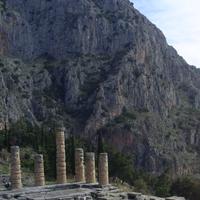Ulixes 7 (Ritchie's Fabulae Faciles)
Ulysses 7 (Ritchie's Easy Tales)
Orta luce Polyphemus iam e somno excitatus idem quod hesterno die fecit; correptis enim duobus e reliquis viris carnem eorum sine mora devoravit.
"Risen" or "Having risen"|||"now"|||awakened from sleep|the same thing||yesterday's|||seizing||||||||||
夜明けに||||||目覚めた|||昨日||||||||||||すぐに|
At dawn, Polyphemus was now awakened from his sleep, the same as he did yesterday; for he quickly seized two of the other men and devoured their flesh without delay.
ポリュペーモスは、昼の光に目を覚まして、前日と同じことをした。他の2人の男たちを捕まえ、すぐにその肉を食べた。
На рассвете Полифем, разбуженный ото сна, сделал то же самое, что и накануне; ибо, схватив двоих оставшихся мужчин, он без промедления сожрал их плоть.
Tum, cum saxum amovisset, ipse cum pecore suo ex spelunca progressus est; quod cum Graeci viderent, magnam in spem se post paulum evasuros venerunt.
||rock or stone|"had removed"|||"his flock"||||||||||||||||would escape soon|
|||||||||||||||見た|||||||脱出する|
Then, when he had removed the rock, he himself proceeded with his cattle from the cave; and when the Greeks saw this, they came with great hope that they would escape after a short time.
石を動かした後、彼は自分の羊とともに洞窟から出てきた。ギリシャ人たちはこれを見て、しばらくすれば脱出するだろうと大いに期待した。
Затем, когда он убрал камень, он вышел из пещеры со своим скотом; что, когда греки увидели, они пришли в великой надежде, что через некоторое время убегут.
Mox tamen ab hac spe repulsi sunt; nam Polyphemus, postquam omnes oves exierunt, saxum in locum restituit.
"Soon"|However||||||||||||rock|||"put back"
||||||||||||出て行った||||戻した
Soon, however, they were repulsed by this hope; for Polyphemus, after all the sheep, went out, and restored the stone into place.
しかしすぐにその希望は打ち砕かれた。なぜなら、ポリュペーモスはすべての羊が出て行った後、石を元に戻したからだ。
Однако вскоре они оттолкнулись от этой надежды; ибо Полифем, после того как все овцы ушли, вернул камень на место.
Reliqui omni spe salutis deposita lamentis lacrimisque se dediderunt; Ulixes vero, qui, ut supra demonstravimus, vir magni fuit consili, etsi intellegebat rem in discrimine esse, nondum omnino desperabat.
|||||"to lamentations"|"and tears"||"surrendered themselves to"||||||we have shown||||of wisdom|"although"|"he understood"|||"in danger"|||entirely|was not despairing
|||||嘆き悲しみ|||身を委ねた||しかしながら||||示した通り||||知恵||理解していた|||||||絶望していなかった
The rest, giving up all hope of safety, surrendered themselves to lamentations and tears; But Ulysses, who, as we have said above, was a man of great design, although he understood that the matter was in danger, had not yet despaired at all.
救いの希望をすべて失い、嘆きと涙に身を委ねた遺族たち。一方、先に示したように偉大なる計略家であったユリシーズは、状況が危ういことは理解していたものの、まだ完全に絶望していなかった。
Остальные, оставив всякую надежду на спасение, предались стенаниям и слезам; Но Одиссей, который, как мы показали выше, был человеком великого совета, хотя и понимал, что дело находится в кризисе, но еще не совсем отчаялся.
Tandem, postquam diu haec toto animo cogitavit, hoc consilium cepit.
At last||for a long time|||||||"he/she/it took"
||||全身全霊で|||||
At length, after he had long thought these things with his whole mind, he took this advice.
ついに、これらを長く心に思い巡らせた後、彼はこの考えを思いついた。
Наконец, долго обдумывая это всем сердцем, он принял такое решение.
E lignis quae in spelunca reposita erant palum magnum delegit.
|"from the wood"||||stored away||a large stake||chose
|||||||||選び取った
Out of the wood that had been laid up in the cave, he chose a great stake.
洞窟にしまわれていた木から大きな棒を選んだ。
Из дров, хранившихся в пещере, он выбрал большой кол.
Hunc summa cum diligentia praeacutum fecit; tum, postquam sociis quid fieri vellet ostendit, reditum Polyphemi exspectabat.
||||sharpened to a point|||||||"he wanted"|||of Polyphemus|
||||||||||行われる|望んでいた||帰還||待っていた
He made him sharpened with extreme diligence; then, after he showed his allies what he wished to be done, he was waiting for the return of Polyphemus.
彼は非常に注意深くそれを作った。そして、味方に何をすべきかを示した後、ポリュペムの帰りを待っていた。
Он подготовил это с величайшей тщательностью; затем, после того как он показал своим товарищам, что он хочет сделать, он стал ждать возвращения Полифема.

